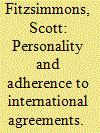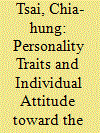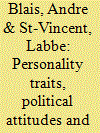| Srl | Item |
| 1 |
ID:
184046


|
|
|
|
|
| Summary/Abstract |
Although Donald Trump’s foreign policy behavior is often characterized as erratic and unpredictable, he was remarkably consistent in his hostility toward international agreements. The president withdrew or threatened to withdraw the United States from several agreements and consistently characterized agreements as ‘horrible deals’ that ‘cheat’ his country. This article explores why Trump exhibited such consistent disdain for international agreements. To address this question, it develops propositions that draw a causal link between a leader’s personality traits and their willingness to challenge constraints: a leader with a relatively high belief in their ability to control events is more likely to challenge constraints than a leader with a lower belief in their ability to control events; moreover, a leader with a relatively high level of distrust of others is more likely to challenge constraints than a leader with a lower level of distrust of others. The article then conducts a plausibility test of these propositions in the context of Trump’s decisions to withdraw from agreements in three significant policy areas: trade (the Trans-Pacific Partnership), environmental stewardship (the Paris Agreement on climate change), and nuclear proliferation (the Iran nuclear deal).
|
|
|
|
|
|
|
|
|
|
|
|
|
|
|
|
| 2 |
ID:
027049


|
|
|
|
|
| Publication |
Massachusetts, Addison - Wesley Publishing, 1971.
|
| Description |
vii, 164p.
|
|
|
|
|
|
|
|
|
|
|
|
Copies: C:1/I:0,R:0,Q:0
Circulation
| Accession# | Call# | Current Location | Status | Policy | Location |
| 006164 | 303.34/KNO 006164 | Main | On Shelf | General | |
|
|
|
|
| 3 |
ID:
165928


|
|
|
|
|
| Summary/Abstract |
This study examines the effects of the Big Five personality traits on individual attitude toward the independence–unification issue in Taiwan. Using an original dataset, this study finds that extraversion and openness to experience are significantly associated with individual attitude toward the independence–unification issue. Specifically, a higher level of extraversion is associated with an increased likelihood of support for unification with China, whereas a higher level of openness to experience is associated with an increased likelihood of support for Taiwan independence. Moreover, higher levels of extraversion and openness to experience increase the likelihood of support for change in cross-strait relations. Also, there are no gender-differentiated effects of personality traits on individual attitude toward the independence–unification issue. Overall, this study concludes that personality traits can provide some explanatory power for individual attitude toward the independence–unification issue. Therefore, personality traits merit more serious attention in the analysis of Taiwanese peoples’ positions on cross-strait relations.
|
|
|
|
|
|
|
|
|
|
|
|
|
|
|
|
| 4 |
ID:
103362


|
|
|
|
|
| Publication |
2011.
|
| Summary/Abstract |
This article examines the link between personality traits, political attitudes and the propensity to vote in elections, using an Internet panel survey conducted in two Canadian provinces at the time of the 2008 federal election and the subsequent provincial elections. It first establishes that the two most proximate attitudes that shape one's propensity to vote are political interest and sense of civic duty. The article then look at specific personality traits (altruism, shyness, efficacy and conflict avoidance) that could affect level of political interest, civic duty and the propensity to vote in elections. In the last part of the analysis, a model is proposed and tested, according to which the impact of personality traits is indirect, being mediated by interest and duty. The article shows that the data are consistent with such an interpretation.
|
|
|
|
|
|
|
|
|
|
|
|
|
|
|
|
| 5 |
ID:
040031


|
|
|
|
|
| Publication |
London, George Allen and unwin Ltd, 1970.
|
| Description |
xii, 328p
|
| Series |
Studies in political theory
|
| Standard Number |
0043200710
|
|
|
|
|
|
|
|
|
|
|
|
Copies: C:1/I:0,R:0,Q:0
Circulation
| Accession# | Call# | Current Location | Status | Policy | Location |
| 007904 | 302.54/BER 007904 | Main | On Shelf | General | |
|
|
|
|
| 6 |
ID:
170739


|
|
|
| 7 |
ID:
172167


|
|
|
|
|
| Summary/Abstract |
An important puzzle in the study of political violence is why individuals risk their lives fighting for a public good, when they can free-ride and enjoy the same benefits if others take the risk. This logic is particularly important to rationalist theories, which view risk as an inherent cost to violent armed group participation—which has to be offset by selective incentives, peer pressure, or coercion. This perspective has widely contributed to the understanding of violent conflict, but ignores key insights from psychology. What if risk is not a cost and instead attractive? In this article, I argue that people with a sensation seeking personality—interested in novel and intense experience and willing to accept risk for the sake of it—are more likely to join armed groups. Preliminary survey evidence comparing voluntarily and forcibly recruited members of Colombian armed groups supports my argument. The re-interpretation of a series of existing studies on Colombian guerrilla and paramilitary fighters illustrates the pervasiveness and varying manifestations of sensation seeking. Personality traits are an under-recognized ingredient in the process of joining armed groups and complement our current understanding, which is mainly determined by contextual conditions and situational motivations.
|
|
|
|
|
|
|
|
|
|
|
|
|
|
|
|
| 8 |
ID:
096255


|
|
|
|
|
| Publication |
2010.
|
| Summary/Abstract |
Anthony Crosland is the outstanding revisionist in the history of the British Labour party and is often said to have been its most influential thinker since the Second World War. His unusual personality is evaluated in relation not only to his political ideas but also to his personal career.
|
|
|
|
|
|
|
|
|
|
|
|
|
|
|
|